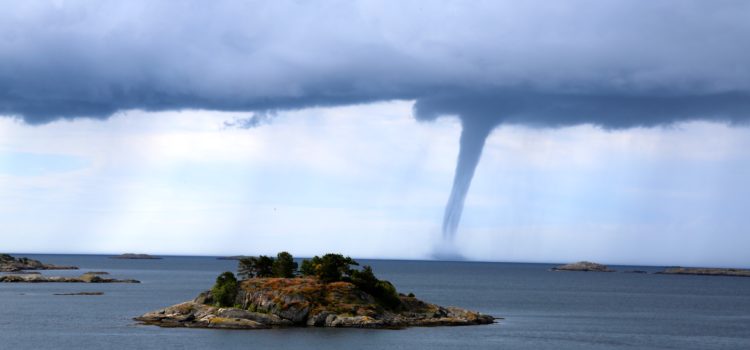

This article is an excerpt from the Shortform book guide to "Unsettled" by Steven E. Koonin. Shortform has the world's best summaries and analyses of books you should be reading.
Like this article? Sign up for a free trial here.
Is the weather getting more extreme? What’s the actual long-term trend?
Former energy industry scientist Steven E. Koonin claims that public misconceptions about human-induced climate change are common. One of these misconceptions is that manmade climate change is causing extreme weather.
Let’s take a look at Koonin’s argument and see what the evidence is.
Extreme Weather
Is the weather getting more extreme? According to Koonin, climate activists portray bouts of extreme weather as the result of human-induced climate change. However, upon examining the data on record temperatures, hurricanes, flooding, and droughts, Koonin concludes that there’s no long-term trend of weather becoming more extreme.
To begin, Koonin disputes the US government’s 2017 Climate Science Special Report (CCSR), which claimed that record-high temperatures outpaced record-low temperatures in the last 20 years, indicating an increased frequency of record highs. Koonin found that the CSSR relied on so-called “running records” that counted a “record” whenever the temperature was higher than the previous high on record. So, initial years frequently recorded “record highs” while later years experienced fewer, as they had more years to compete with. In turn, both record highs and record lows become less frequent over time, as records became harder to set. Consequently, the claim that record highs were more frequent than record lows was only true in a relative sense, as record lows were occurring even less frequently than record highs.
(Shortform note: The CSSR’s authors, not the original researchers who published them, are responsible for any misrepresentation of these running records. While the CSSR used the running records to argue that record highs are becoming more frequent, the original authors did not. Rather, they cited these running records as evidence of a warming climate in general—not of extreme heat in particular.)
To deliver more accurate results, Koonin compiled data illustrating the frequency of absolute high and low temperatures, which are simply the highest or lowest temperatures over the entire timespan. Using this data, he found no discernible trend in record-high temperatures since 1900, though record-low temperatures became less frequent. So, the CSSR’s claim about record high temperatures was at best misleading, if not outright false, according to Koonin.
(Shortform note: Although absolute record high temperatures aren’t becoming more frequent in the US, that doesn’t mean that extreme heat isn’t getting worse. After all, research indicates that heat waves—sustained periods of abnormally high temperatures—are becoming more frequent in American cities, as they only occurred twice annually in the 1960s, compared to six times annually in the 2020s. So, Koonin may be too quick in dismissing any trend toward extreme heat on the basis of record temperatures alone.)
In a similar vein, Koonin criticizes the US government’s 2014 National Climate Assessment (NCA), which reports that the intensity and frequency of North Atlantic hurricanes has been increasing since the 1980s. Once again, Koonin finds that this claim is misleading—upon examining the data on North Atlantic hurricanes dating back further to the 1940s, he says there’s no discernible long-term trend. In fact, any slight increase in hurricane activity from 1985 to 2010 is offset by a similar decrease from 1965 to 1985.
Indeed, Koonin notes that the IPCC’s fifth assessment report (AR5) confirms this result: In 2013, it reported low confidence in any long-term increase in hurricane activity. By extension, Koonin concludes there’s no evidence suggesting humans are responsible for an increase in hurricane activity—after all, we can’t be responsible for a trend that doesn’t exist.
(Shortform note: Recent findings from the IPCC’s sixth assessment report, AR6, tell a slightly different story from AR5: With respect to Atlantic hurricane activity in particular, AR6 reported with medium confidence that human activity has been partially responsible for increased hurricane activity since the 1970s.)
Finally, Koonin also questions a related pair of weather phenomena: floods and droughts. As for floods, Koonin asserts that the IPCC’s AR5 reported low confidence in any global trends regarding the magnitude and frequency of floods. So, according to the UN’s own climate scientists, we aren’t sure whether floods are increasing globally.
As for droughts, AR5 echoes the same sentiment: There’s little evidence that droughts are becoming more prevalent worldwide since the 1950s. Koonin notes that the same is true in the US specifically, as average drought conditions have shown no discernible trend since 1890.
(Shortform note: Since Unsettled’s publication in 2021, the UN has changed its analysis of droughts; in 2022, it reported that droughts had grown more severe and frequent worldwide since 2000. The report warns that, in the coming decades, dozens of countries will face increased drought related to population growth and climate change.)

———End of Preview———
Like what you just read? Read the rest of the world's best book summary and analysis of Steven E. Koonin's "Unsettled" at Shortform.
Here's what you'll find in our full Unsettled summary:
- That humans are only partially to blame for the warming climate
- Why the proposed solutions to climate change are unlikely to succeed
- Alternative responses to climate change and how to improve understanding






